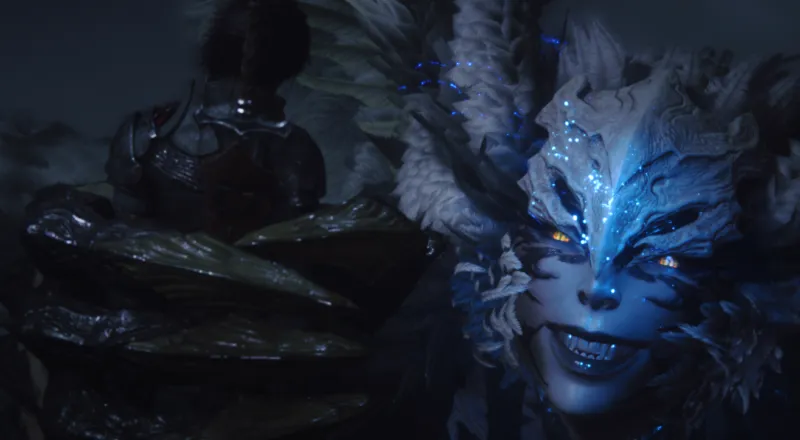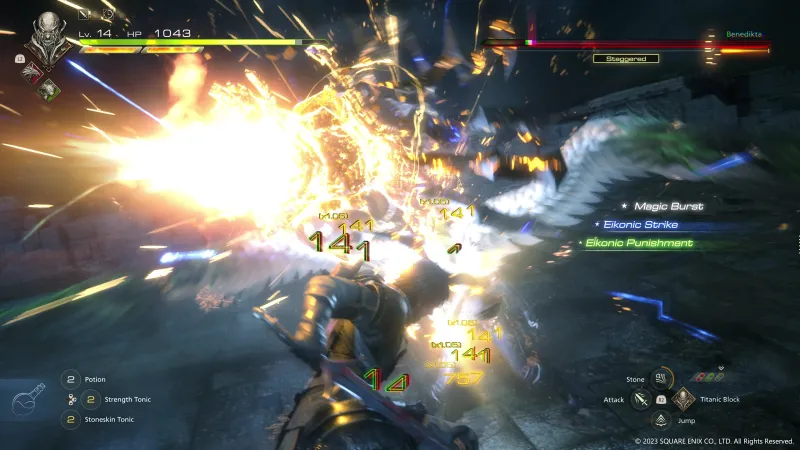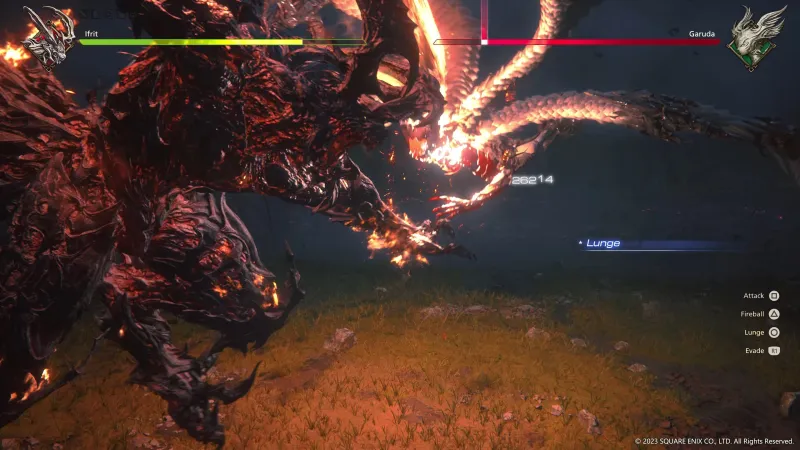
After previewing Final Fantasy XVI for roughly two hours, which you can read about here, I’m left most interested in the different styles of combat happening throughout the game. Clive has his own style of Devil May Cry-esque combat, party members controlled by A.I. up the ante, Clive’s dog Torgal can attack enemies, Clive can fight Eikons, and there are even Eikon vs. Eikon fights. It’s a lot for one game to juggle, and after my relatively short preview, I feel that the team is confident in this balancing act.
But I wanted to learn more, so I asked FFXVI producer Naoki Yoshida, director Hiroshi Takai, and combat director Ryota Suzuki how the team manages so many unique combat experiences.
“With regular Clive battles…this is the type of battle that players are going to be experiencing the most, and you spend most of the time controlling Clive,” Suzuki tells me. “You’re going to be playing this style of combat for the longest, and so through these battles, your character is going to be leveling up, and as you level up, the type of actions that you have will increase, and you’ll be able to upgrade those and get new ones.”
For example, about five hours in, which is when my preview took place, Clive has access to abilities from various Eikons like the Phoenix and the Titan. At any time, Clive can press Circle to activate a special Eikon ability. The Phoenix’s Circle ability lets Clive dash-teleport to an enemy in a fiery blaze, whereas the Titan’s saw Clive summon a small rock shield on his forearm capable of blocking most incoming attacks for a short duration.
There are also two special abilities (on a timer ) that can be equipped with each Eikonic ability wheel. The Phoenix has large AOE fire attacks at this point in the game, and after using them, I could press R2 to quickly shift to my Titan wheel, giving me access to two more abilities. These abilities allow Clive to summon a large rock hammer that does devastating melee damage, and you can even release the button at a specific moment in the swing to do extra damage. It’s fast and slick, and switching between the wheels feels great.

Suzuki says the team at Creative Business Unit III wanted something that felt easy to access and use for longer periods of time. And he says it’s a nice touch that each of the special abilities speaks to the larger narrative going on. I asked the team if Clive, who is not a Dominant, meaning he cannot transform into an Eikon, is collecting Eikons in a Pokémon-esque way or if he’s outright becoming them, like a Dominant. Unsurprisingly, I couldn’t get much by way of an answer.
“Clive is not a Dominant, so he shouldn’t have these powers,” Yoshida tells me. “Going through the story, we will find how Clive comes across his powers and makes them his own. But again, because that is so closely tied to the narrative, by telling you any more right now, we’d be giving away spoilers.”
On top of Clive’s combat, which is completely under your control, his dog Torgal (yes, you can pet Torgal) can attack enemies as well. You can manually assign his attacks to enemies or equip a new accessibility-related accessory, the Ring of Timely Assistance (more on that here), to have Torpal attack automatically. Party members will join Clive from time to time – Cidolfus Telamon (there’s always a Cid) joined me during my preview, utilizing Ramuh’s lightning abilities in combat – but they will always be controlled by AI, according to Yoshida.

Clive will be fighting both standard enemies and bosses in the way I described above, but he’ll also have to fight Eikons, too. I fought Garuda, traditionally a wind summon in Final Fantasy, as Clive. While it was flashy and cinematic, it was the most boring combat scenario I experienced. I was mostly button-mashing to attack this much larger boss in a very small arena until cinematic button prompts appeared on screen, which allowed me to advance the fight. Significantly more exciting was the fight that came next: Eikon vs. Eikon.
I controlled Clive in the form of Ifrit against Garuda, and it was a blast. You can read more about it in my full FFXVI preview here. I asked the team how it approached these combat scenarios.
“Eikon vs. Eikon battles come at pivotal moments during the story, and are tied directly to the story,” Takai says. “We had to create them around those story beats. In creating these, we had these ideas that we started off with. We knew that at this point in the story that Clive would be meeting this Eikon and that they would have to fight this type of battle using these types of actions. And so once we knew that we had a template…to hand over to Suzuki-san, and they could create a battle around that.”
Yoshida says the Ifrit vs. Garuda battle I experienced happens early in the game.
“Clive is still kind of getting used to using an Eikon,” he says. “That’s why it has that certain feel; it feels like he’s getting used to it, and this ties directly into the story. As the story progresses, the players feel [Eikons] controlling quite differently.”
Yoshida says the guiding principle with Eikon combat is that players are always going to “get something that feels like it really, really fits the narrative as well as the battle itself,” stating it should always feel “awesome.”
Source: Game Informer Final Fantasy 16: How Square Enix Balances So Many Different Combat Experiences In One Game

